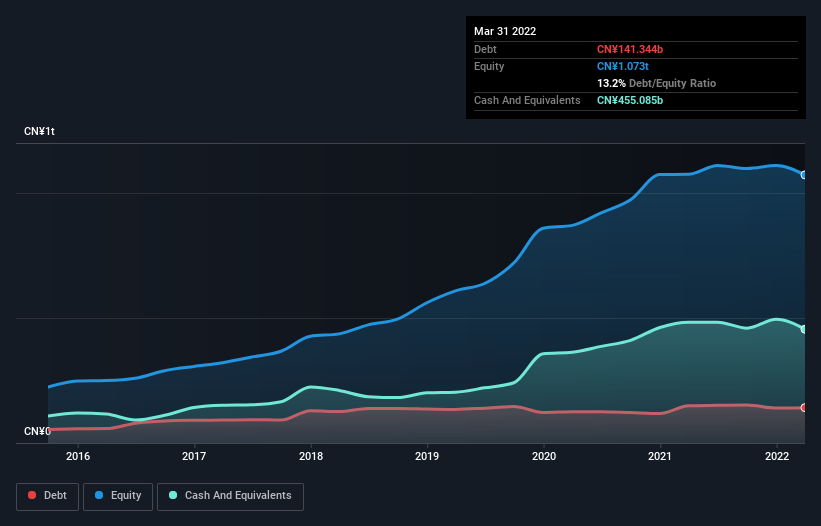Is Alibaba Group Holding (NYSE:BABA) A Risky Investment?
David Iben put it well when he said, 'Volatility is not a risk we care about. What we care about is avoiding the permanent loss of capital.' So it might be obvious that you need to consider debt, when you think about how risky any given stock is, because too much debt can sink a company. We note that Alibaba Group Holding Limited (NYSE:BABA) does have debt on its balance sheet. But the real question is whether this debt is making the company risky.
When Is Debt Dangerous?
Debt assists a business until the business has trouble paying it off, either with new capital or with free cash flow. Part and parcel of capitalism is the process of 'creative destruction' where failed businesses are mercilessly liquidated by their bankers. While that is not too common, we often do see indebted companies permanently diluting shareholders because lenders force them to raise capital at a distressed price. Of course, debt can be an important tool in businesses, particularly capital heavy businesses. The first thing to do when considering how much debt a business uses is to look at its cash and debt together.
See our latest analysis for Alibaba Group Holding
What Is Alibaba Group Holding's Debt?
As you can see below, Alibaba Group Holding had CN¥141.3b of debt at March 2022, down from CN¥149.2b a year prior. However, its balance sheet shows it holds CN¥455.1b in cash, so it actually has CN¥313.7b net cash.
How Strong Is Alibaba Group Holding's Balance Sheet?
According to the last reported balance sheet, Alibaba Group Holding had liabilities of CN¥383.8b due within 12 months, and liabilities of CN¥239.2b due beyond 12 months. Offsetting these obligations, it had cash of CN¥455.1b as well as receivables valued at CN¥56.9b due within 12 months. So its liabilities total CN¥111.0b more than the combination of its cash and short-term receivables.
Of course, Alibaba Group Holding has a titanic market capitalization of CN¥1.82t, so these liabilities are probably manageable. Having said that, it's clear that we should continue to monitor its balance sheet, lest it change for the worse. While it does have liabilities worth noting, Alibaba Group Holding also has more cash than debt, so we're pretty confident it can manage its debt safely.
On the other hand, Alibaba Group Holding's EBIT dived 14%, over the last year. If that rate of decline in earnings continues, the company could find itself in a tight spot. There's no doubt that we learn most about debt from the balance sheet. But ultimately the future profitability of the business will decide if Alibaba Group Holding can strengthen its balance sheet over time. So if you want to see what the professionals think, you might find this free report on analyst profit forecasts to be interesting.
Finally, a company can only pay off debt with cold hard cash, not accounting profits. While Alibaba Group Holding has net cash on its balance sheet, it's still worth taking a look at its ability to convert earnings before interest and tax (EBIT) to free cash flow, to help us understand how quickly it is building (or eroding) that cash balance. Happily for any shareholders, Alibaba Group Holding actually produced more free cash flow than EBIT over the last three years. That sort of strong cash conversion gets us as excited as the crowd when the beat drops at a Daft Punk concert.
Summing Up
While it is always sensible to look at a company's total liabilities, it is very reassuring that Alibaba Group Holding has CN¥313.7b in net cash. And it impressed us with free cash flow of CN¥89b, being 142% of its EBIT. So we don't have any problem with Alibaba Group Holding's use of debt. There's no doubt that we learn most about debt from the balance sheet. However, not all investment risk resides within the balance sheet - far from it. Be aware that Alibaba Group Holding is showing 2 warning signs in our investment analysis , you should know about...
If you're interested in investing in businesses that can grow profits without the burden of debt, then check out this free list of growing businesses that have net cash on the balance sheet.
Have feedback on this article? Concerned about the content? Get in touch with us directly. Alternatively, email editorial-team (at) simplywallst.com.
This article by Simply Wall St is general in nature. We provide commentary based on historical data and analyst forecasts only using an unbiased methodology and our articles are not intended to be financial advice. It does not constitute a recommendation to buy or sell any stock, and does not take account of your objectives, or your financial situation. We aim to bring you long-term focused analysis driven by fundamental data. Note that our analysis may not factor in the latest price-sensitive company announcements or qualitative material. Simply Wall St has no position in any stocks mentioned.
Join A Paid User Research Session
You’ll receive a US$30 Amazon Gift card for 1 hour of your time while helping us build better investing tools for the individual investors like yourself. Sign up here

